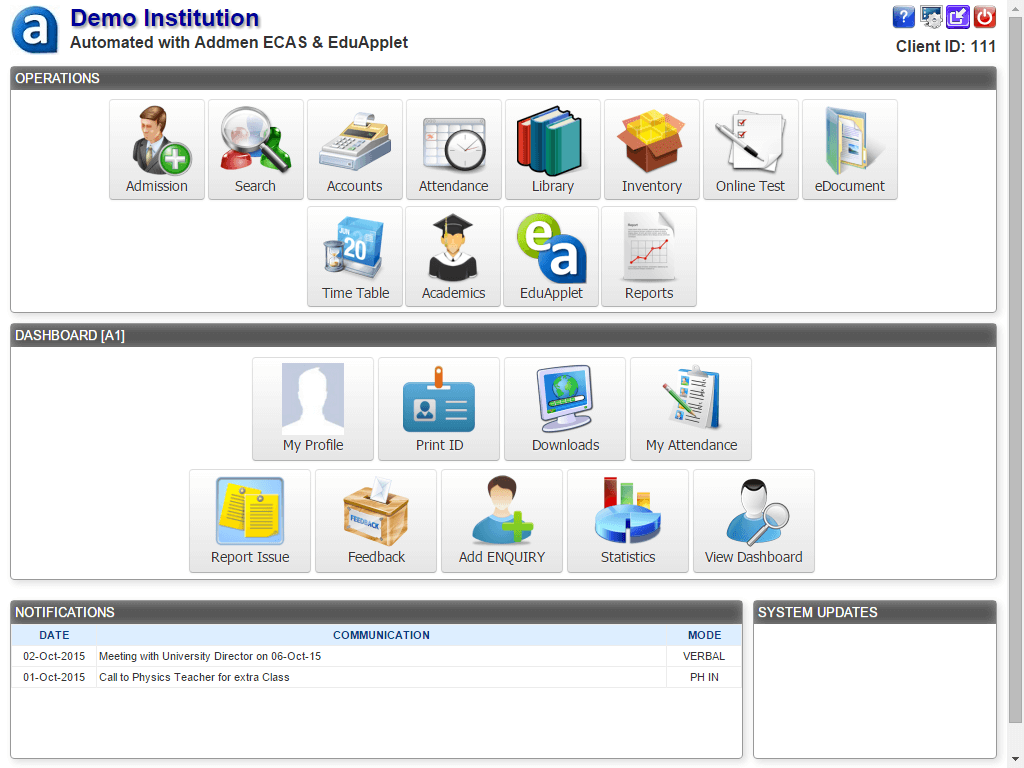Telephonic Lead Management Software for Institutes
Most enquiries to schools, colleges, universities, and coaching institutes come via telephone — it’s immediate, efficient, and personal. But with high call volumes, missed or delayed responses, and repetitive information requests, many potential students or clients can slip through.
ECAS (Enhanced Campus Automation System) by Addmen Group provides a robust Telephonic Lead Management module that helps institutions manage telephonic enquiry workflows flawlessly.
How ECAS Telephonic Lead Management Works
- Browser-based system with centralized database: ECAS runs on web servers so all lead/enquiry data is maintained centrally. Authorized staff from any branch or location can access past records, which speeds up response time and enhances follow-up.
- Automatic caller identification: When a call arrives on a designated institute number, ECAS checks whether the telephone number already exists in its database. If so, it fetches past enquiry history, saving staff from asking repetitive basic questions.
- New enquiry registration: If it’s a new caller with an unrecognized number, ECAS immediately opens a fresh registration form to capture relevant personal and enquiry details.
Key Features of Telephonic Lead Management
Key Features of Telephonic Lead Management
| Feature |
Description & Benefit |
| Caller history pull-up |
The system auto-opens previous communication logs for known numbers, allowing staff to engage more personally and efficiently. |
| Alternate contact display |
ECAS shows alternate phone numbers registered by a lead—useful in ensuring reachability or follow-ups. |
| Call routing during peak load |
When many calls come at once, the system routes them to idle agents or available lines to reduce customer wait times and improve satisfaction. |
| Priority handling of first‑time callers |
Institutes can configure that new leads are handled by senior or experienced staff first, ensuring best chances of conversion. |
| Cross‑branch record access |
Enquiry records entered in one branch are accessible from another (depending on permissions), enabling better coordination and continuity. |
| Logging & communication tracking |
Every call/enquiry gets time‑stamped with details of what was discussed; updates are logged so that subsequent follow‑ups have context. |
Why Telephonic Lead Management Matters for Educational Institutes
- Improve lead conversion rates: Fast responses, personalised communication, and tracking lead history help convert more enquiries into admissions.
- Reduce response time: Caller identification and past data recall reduce the time spent in repetitive data collection.
- Better reputation & trust: Quick, efficient handling of calls gives a good impression; institutions that respond well often stand out.
- Lower administrative burden: Automating enquiry registration, routing, and follow‑ups frees staff to focus on high‑value tasks.
- Data‑driven follow‑ups: Knowing which leads are old, which ones require follow‑ups, and tracking outcomes enables management to refine marketing & admission strategies.
Use-Cases & Scenarios
- Coaching institutes with multiple branches wanting to centralise enquiry handling.
- Schools with heavy phone traffic especially during admission seasons.
- Colleges or universities wanting to ensure that no prospective student’s call goes unanswered or is delayed.
- Institutions tracking enquiry sources or wanting to distinguish between repeated callers vs new leads.
Security, Permissions & Access Control
- Defined roles & user permissions ensure that only authorized staff can view or edit enquiry logs, access cross-branch data, or change lead records.
- Audit logs record who handled which calls, what updates were made, and when.
- Data is stored securely; compliance with relevant data protection norms to protect personal phone numbers, IDs, etc.
Related Links:
